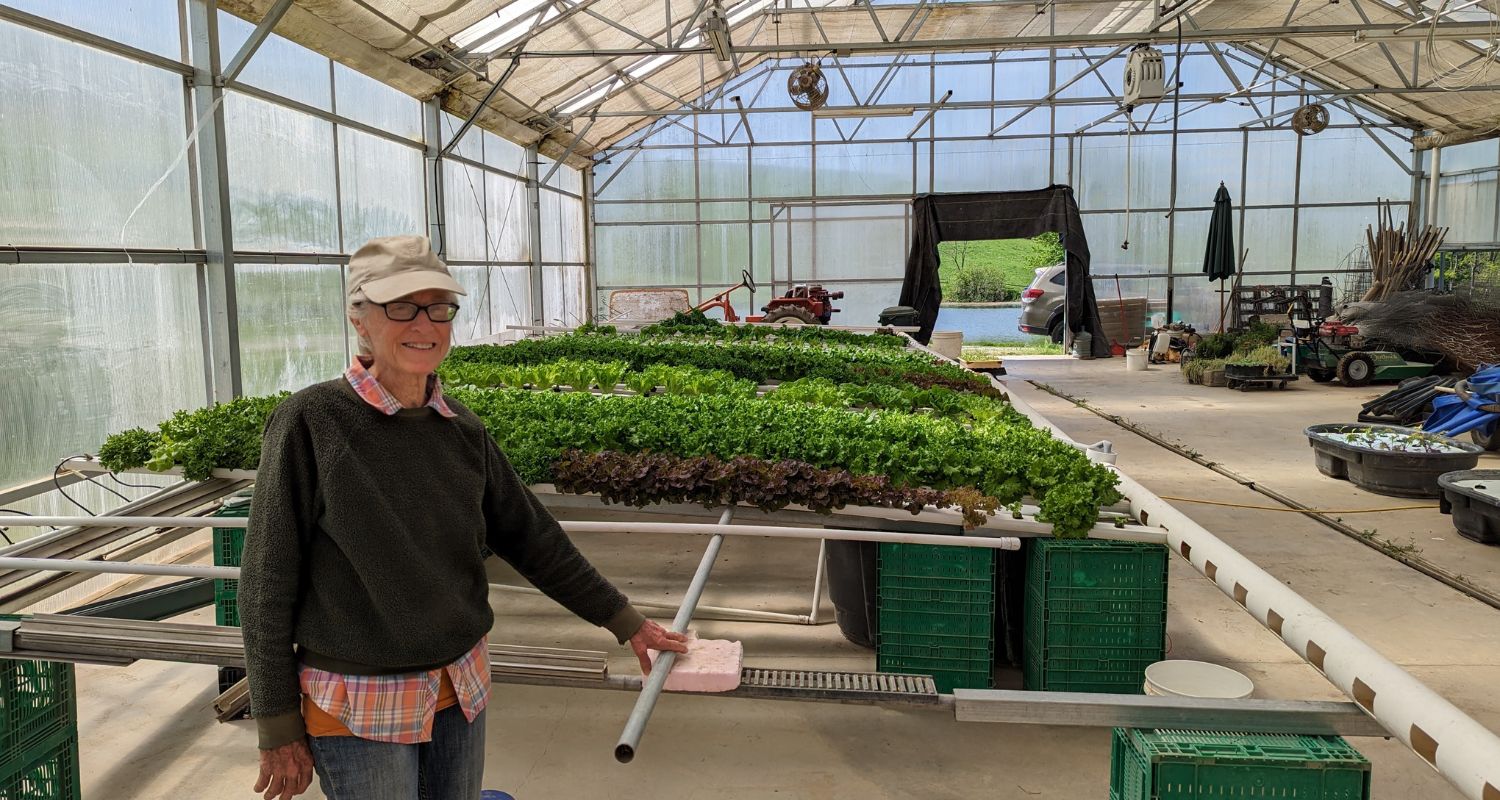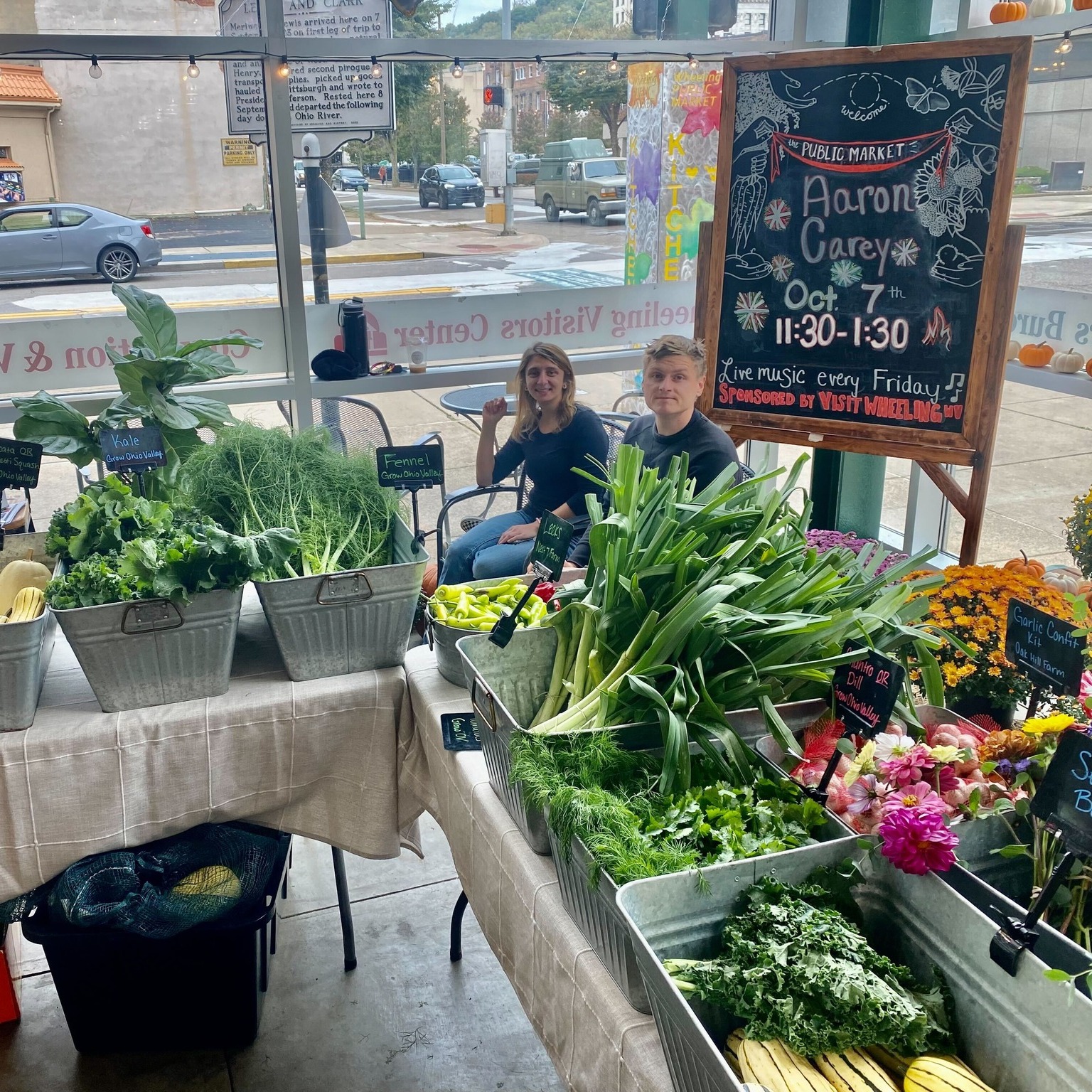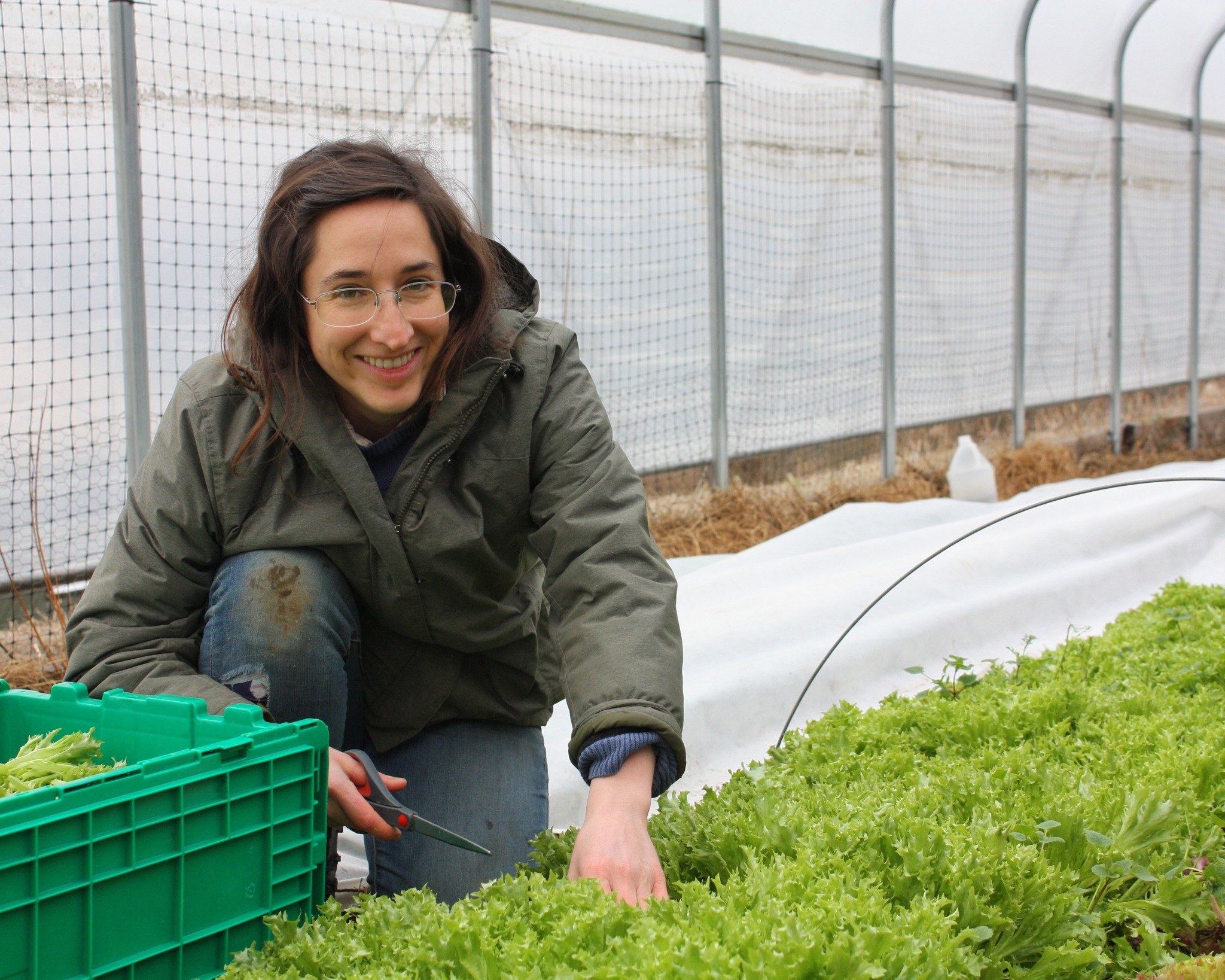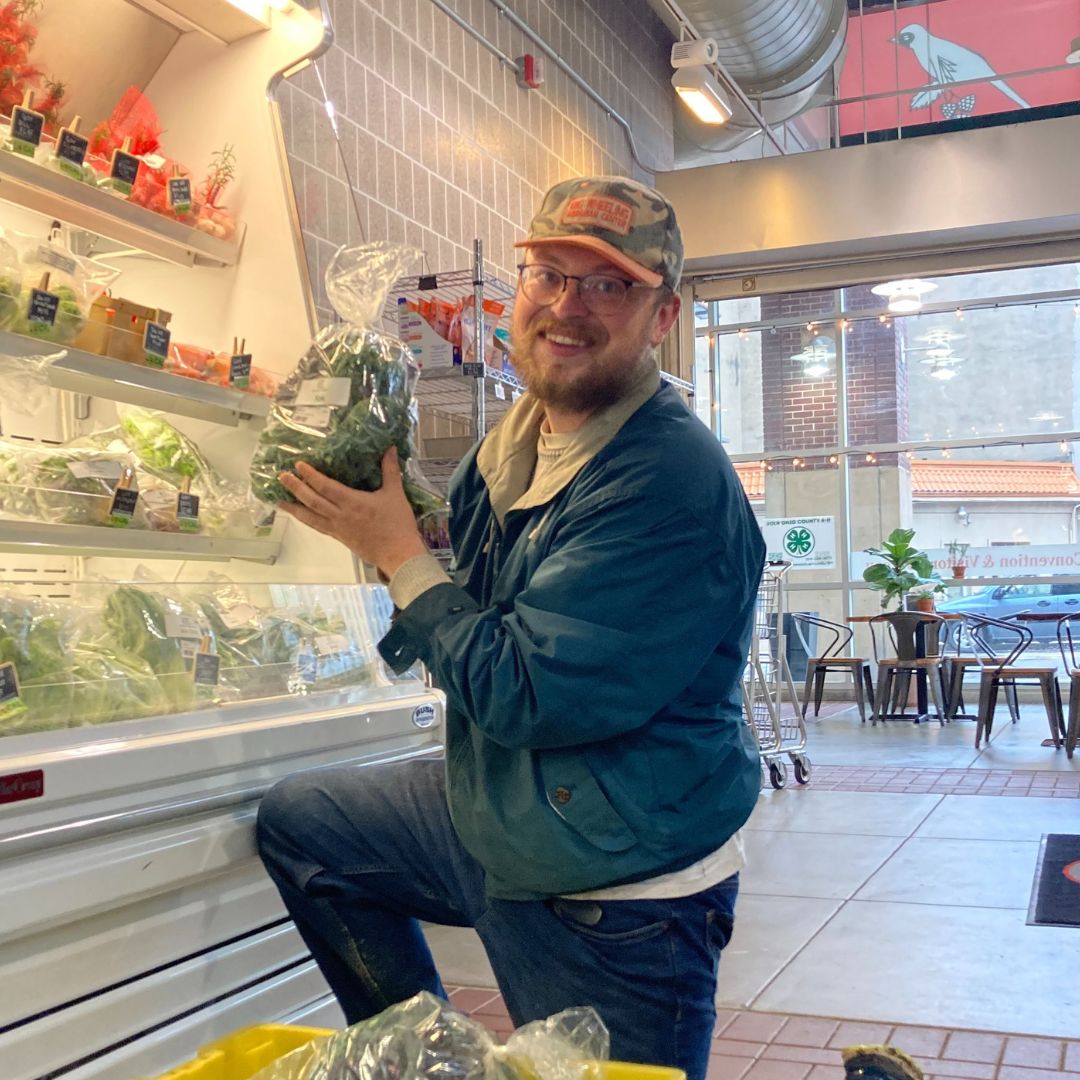Grow Ohio Valley’s summer CSA–or community supported agriculture–program will launch on June 29, 2023, its tenth consecutive year of providing fresh, local produce to Wheeling. Bundles are sold as full shares, for $450, or partial shares, for $285, and will run for fifteen weeks. You can also use SNAP to purchase a share at 50% the cost. An average of eighty customers take advantage of the opportunity to support local growers per year. If this sounds like something you’d like to be a part of, you are in luck! Grow Ohio Valley is still accepting orders for the CSA shares.
Sarah Stec, Urban Farm Manager, has worked for the last five years at Grow Ohio Valley coordinating vegetable production and spearheading the CSA program. Stec says she knew farming was for her after the first time she worked on a farm. “It’s in large part because of the sense of community I found with every farmer I met,” Stec said. “Farmers have dissected life to its simplest components–food and people.”
Speaking about the CSA, Stec said, “It’s good to see a community come together around the CSA.” Grow Ohio Valley offers tomatoes, peppers, cucumbers, and herbs to the shares, but the vast majority of produce comes from three regional growers–Oak Hill Farm, Next 7 Organic Farm, and Eric Freeland’s Farm–Stec has worked with for years. Stec says it’s these relationships that are the most rewarding part of her job. “It’s great to provide a sales outlet for the farmers that we work with,” she said.
Beth Smith of Oak Hill Farm in Avella, Pennsylvania, has been on her property since 1985. Smith’s husband raised their family on the property alongside cattle while she worked as a law librarian in Pittsburgh. In 2000, Smith began a modest vegetable production of the Pennsylvania Sweet Onion with the PA Growers Association, and has since expanded to a variety of crops. Smith sells her produce at Farmers Markets in Carnegie and McDonald, PA, to local customers, at the Public Market in downtown Wheeling, and to Grow Ohio Valley’s CSA program.
Oak Hill Farm is protected from development through a Farmland Preservation program, something of great importance to Smith. “It doesn’t do anyone any good if you don’t have any food,” Smith said of the pressure on farmers to get rid of their land. She utilizes trickle tape to conserve water and avoid erosion. Smith has been growing her lettuce hydroponically for years, allowing her to maximize the growing potential of her space and extending the growing season year-round.
Smith noted some challenges to growing in the Ohio Valley. Weed control, access to labor, and transportation from her rural farm site among them. She also said the weather seems to be getting more extreme and unpredictable. “Rain storms are a deluge and the dry spells stay for longer,” Smith said. Despite these challenges, she says her soil still produces a lot of produce.
Smith says it’s an advantage to partner with an organization like Grow Ohio Valley who she says is knowledgeable and cooperative. “I’m not someone like Dudas farm who can sell to grocery stores,” Smith said. Speaking about the CSA, Smith said, “It’s an enjoyable thing to work with; it’s been real helpful to sell my vegetables.” CSA customers can expect to find Oak Hill Farm sweet potatoes, garlic, leeks, onions, shallots, melons, and summer and winter squashes in their shares this year.
Although Next 7 Organic Farm of Cadiz, Ohio, was officially chartered in 2015 by Holly and Isaac Wiegmann, the property has been owned by Holly’s family since 1805. Holly herself has farmed on the land since 2009–previously called Herbold Organic Farm–but before that she showed little interest in the profession. In contrast, Isaac’s first memories involved helping his grandparents in their greenhouses growing and selling plants. When the couple joined forces they were able to expand to farmers markets in St Clairsville, OH, Mt Lebanon, PA, Washington, PA, and Wheeling, WV.
In 2020 the family welcomed their second child to the farm right as the COVID-19 pandemic took hold. Not wanting to expose her young family to the virus, Holly stopped selling at farmers markets and began exclusively selling at the Public Market in downtown Wheeling. “Grow Ohio Valley kept us afloat,” Holly said, saying without the organization they would likely be seeking off-farm jobs. Next 7 Organic Farm was also able to expand into the restaurant scene in Wheeling, a community the Wiegmann’s say are key supporters of their work.
There are challenges to growing in the Ohio Valley, including pest management and access to capital. “A lot on the farm is a penny in, a penny out,” Isaac said. Ultimately, though, they appreciate the pace of life on their farm. “It’s about the cultivation of sustenance and human intention on the landscape,” Isaac said. “The field is your canvas–it’s a piece of art,” Holly added. As for their kids, they sometimes question why they have to work, to which Holly responds, “We’re feeding the hungry people.” Holly says it’s something they can feel good about.
Speaking about the CSA program, Holly said Stec has been amazing. “Her heart is in supporting local farmers. She’s a magic woman.” Thanks to the partnership between Grow Ohio Valley and Next 7 Organic Farm, CSA recipients can expect kohlrabi, green onions, garlic scapes, green beans, okra, chard, potatoes, beets, herbs, and flowers in their shares. The Weignmann’s are also excited to start selling at markets again like the Wheeling Farmers Market.
Eric Freeland of Eric Freeland’s Farm in Wellsburg, West Virginia, has been farming for forty years, and it’s something he grew up doing with his parents and grandparents. He believes stewarding the land is important so as to leave it in good condition for the next person. He combines old-school ways of farming with newer technologies to utilize every bit of his land.
Freeland admits it can be tough growing in the Ohio Valley, saying there’s only one other grower he knows of in Brooke County that has readily available food. He says he has noticed a trend in recent decades of people turning away from agriculture–something he worries about. “Farming is generational,” Freeland said. “If someone misses a generation of farming you lose how much property and skills there is to pass down.” In contrast, Freeland says the COVID-19 pandemic encouraged people to support local growers amid fears of supply chain shortages.
A lot of his produce is sold on the property, something Freeland takes pride in. He has built a little storefront where folks can come and shop his produce, as well as honey and baked goods from other local producers. Freeland also started doing pick-your-own produce events and Halloween tours on his property–advertised on his Facebook page–something people have been excited about. He says it’s a benefit for his customers to know where their food is grown, but also a chance for him to save on labor costs–another challenge shared by growers in the region.
The Public Market and the CSA program have offered Freeland new outlets to sell his produce. He says it gives people in Wheeling the chance to support his farm who otherwise can’t make it to his Brooke County property. Grow Ohio Valley’s CSA program will see Freeland’s well-known berries–like strawberries, blackberries, and raspberries–in their shares, along with sweet corn, potatoes, green beans, and zucchini.
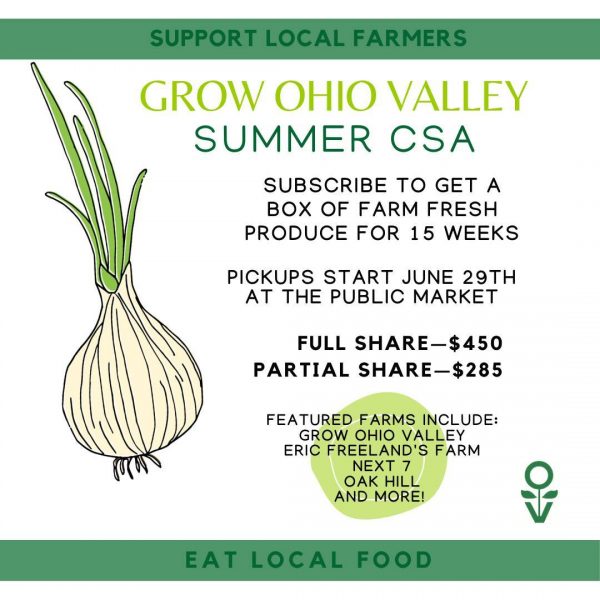
Each week is different during Grow Ohio Valley’s fifteen-week CSA program, with vegetables and fruits interchanged regularly. Recipes are also included to give participants inspiration on how to use their shares to their fullest. You can purchase a share on Grow Ohio Valley’s website to support local farmers, sustain their work, and receive the freshest produce in the Ohio Valley. SNAP recipients can purchase a share at half the cost. Pickups start on June 29 at the Public Market–follow Grow Ohio Valley’s Facebook for more information.



